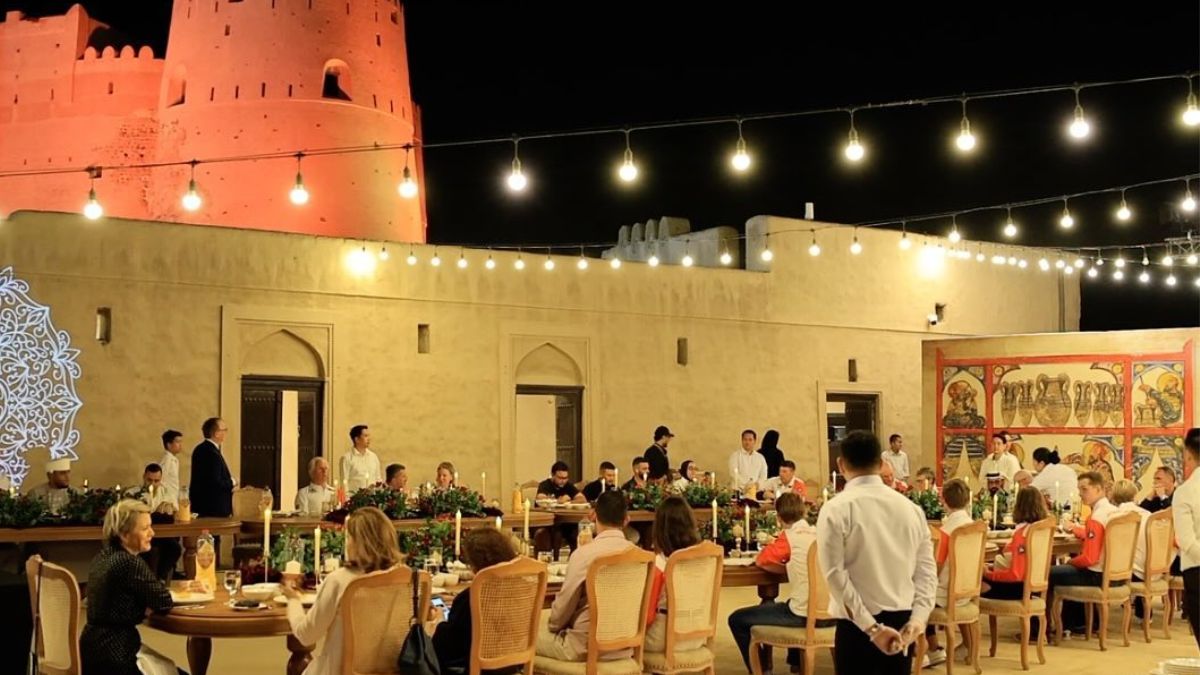In a unique fusion of history and culinary artistry, chefs in Fujairah, comprising both Emirati and expatriates, orchestrated a grand dining experience. The display of culinary prowess was crafted within the iconic Fujairah Fort. Together, these four culinary experts delved into the past, recreating medieval cuisine dating back over a thousand years. Here’s an outline of the culinary event that was a blast from the past for the ones present.
Expertise Of Dr Daniel Newman In Crafting A Medieval Arab Feast
To bring this exceptional dining event to life, the chefs drew upon the knowledge of Dr. Daniel Newman. For the ones who don’t know him, he is an award-winning writer and scholar. He specialises in Arabic literature translation, cultural exchanges between Europe and the Arab world, and food history. Dr. Newman’s expertise played a pivotal role in curating a feast that transported guests to medieval Arab culinary traditions.
Historical Beginnings: Lighting Bakhoor And Ghasool Ritual
The grand feast, organized by the Fujairah Culture and Media Authority, commenced with the lighting of bakhoor, a traditional incense. Also, the traditional handwashing ritual known as Ghasool, dating back to the 10th century was observed. Dr Newman highlighted that in medieval times, dinner feasts initiated with cold dishes, and millet bread, now uncommon. Back then it was a prevalent choice.
Local Chefs’ Culinary Mastery At Fujairah Fort
Local chefs Umm Khamees, Masu’d Al Kindi, Abeer Allouz, and Ahmad Azzam demonstrated their culinary prowess. They meticulously prepared dishes from the medieval age. Also, they skillfully incorporated ancient ingredients and spices, offering a sensory journey through time.
Emirati chef Masu’d Al Kindi crafted Al Kamil, a dish traditionally reserved for royalty and the affluent. Describing the culinary spectacle, Al Kindi revealed the preparation of chickens stuffed inside lamb. It is further encased within a whole camel, a culinary marvel cooked for over 26 hours.
Arab Influence on European Cuisine
Dr. Newman emphasized the significant influence Arabs had on European cuisines. He explained how Arabs introduced the use of spices, rose water, vegetables like asparagus, fruits like oranges, and even sugar to the West. This collaboration transformed Fujairah Fort into a historic dining haven. And, it also allowed guests to relish the flavours of ancient times infused with a modern touch.
Three-Way Fish Dish With Umm Khamees’ Culinary Innovation
Emirati chef and spice expert Umm Khamees presented a distinctive fish dish prepared in three simultaneous ways
Also Read: BurJuman Mall, Dubai Is Hosting A Month-Long Food Festival Starting Tomorrow!
Desserts of the Medieval Age
The medieval-inspired dinner concluded with sweet treats typical of the era. Dishes included dates, carrot pudding with walnuts, and apricots stuffed with almonds. Don’t forget about the Mamunia, a rice pudding made with rich fat from a sheep’s tail. Dr. Newman highlighted the consumption of Shikanjabeen, a Persian term for a mixture of vinegar and honey. It’s believed to strengthen the stomach, aid digestion, and possess medicinal properties. This culinary journey bridged the gap between the past and the present. It offers a unique and unforgettable experience. To sum up, here’s how the event concluded with a tonne of dishes from the medieval age.
Cover Image Courtesy: Medieval Arab Cooking/ Insta
For more such snackable content, interesting discoveries and latest updates on food, travel and experiences in your city, download the Curly Tales App. Download HERE.
Good news! We are on WhatsApp! Subscribe to Curly Tales WhatsApp Channel to stay up-to-date with exclusive content and BTS. Join HERE.

